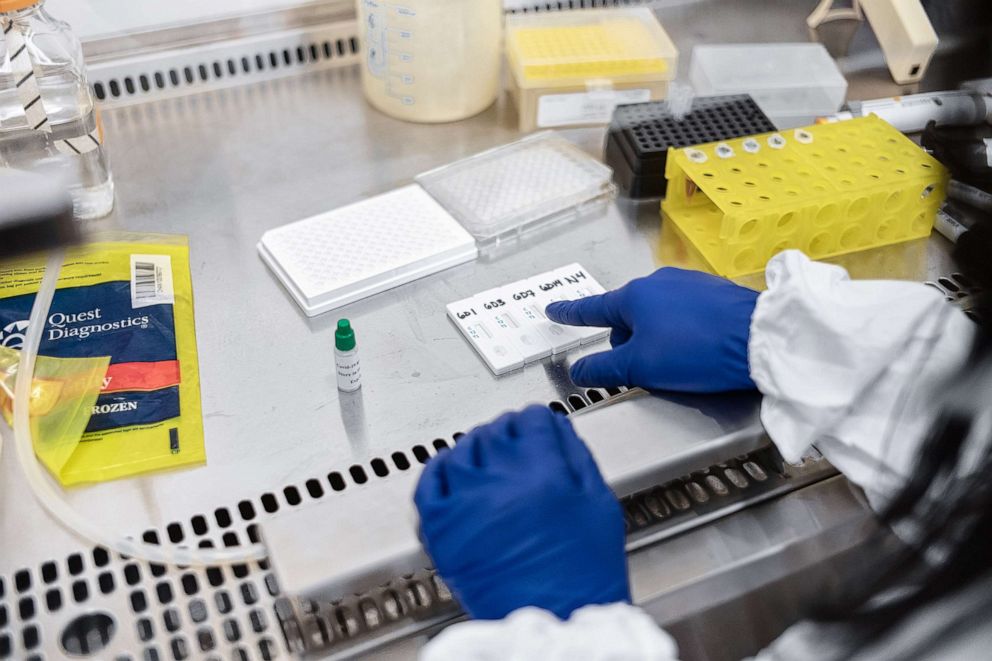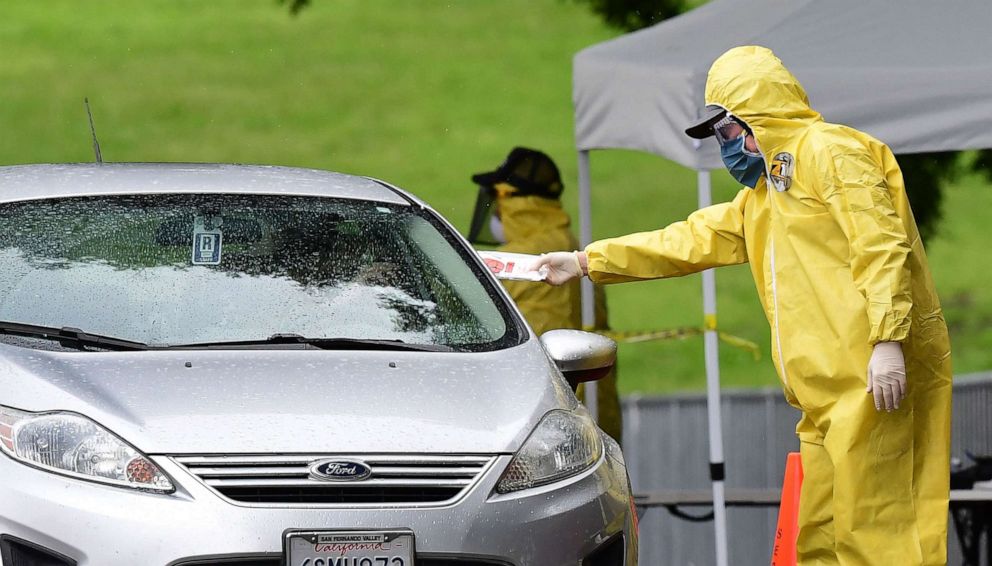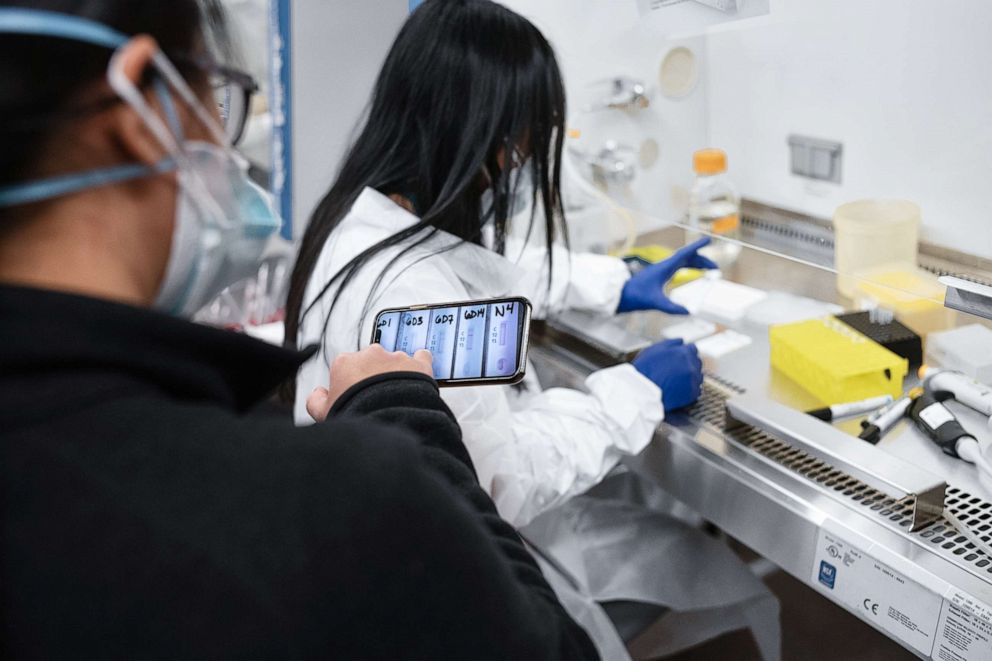When will we know if COVID-19 antibodies prevent reinfection?
"We feel this pressure because we want to help people."
Antibody tests, which reveal whether someone has been infected with the novel coronavirus, have been touted as key to reopening the economy and restoring a sense of stability to quotidian life. The hope is that people who've been infected by and develop antibodies may be able to ward off future reinfections, confidently returning to everyday life.
But for now, it's just that: a hope. Medical experts have said it's premature to rely on antibody testing as a singular solution to reopening the economy.
One crucial step will be determining whether antibodies indeed confer immunity and protect an individual from further reinfection, which experts said could take years to determine. Experts studying this new virus still don't know if these antibodies indicate protection -- and, if so, for how long, to what extent?
"This outbreak is moving much more rapidly than previous coronavirus outbreaks have -- it's more widespread, with a greater number of patients," Dr. Aneesh Mehta told ABC News. His team at the Division of Infectious Diseases at Emory University School of Medicine has now helped launch a COVID-19 antibody testing initiative.

Results so far have been telling, but time's required to gauge the strength and longevity of the average person's antibody response.
"We believe that the antibodies that we're detecting do confer some level of protection, but we want to know how much and how long that protection lasts," Mehta added.
Studying previously documented immune responses that included antibody production may help researchers better understand the properties of antibodies produced against COVID-19.
But not all antibodies are created equal -- tremendous variance is seen in immune system responses to different viruses. Some antibodies confer early and long-term immunity, while others take longer to develop and are short-lived, providing a limited period of protection. It's now known that antibodies produced in patients who contracted SARS, which emerged less than two decades ago and belongs to the same coronavirus family as COVID-19, confer protective immunity for several years.
Medical professionals are hopeful antibodies produced in response to COVID-19 offer similar protection. Preliminary studies on monkeys suggest COVID-19 antibodies provide partial, short-term protective immunity to reinfection, but, as Harvard epidemiologist Marc Lipsitch recently wrote for The New York Times, these early results are just "educated guesses."
Antibody tests primarily are used to develop more robust surveillance systems to estimate the scope of disease spread, and while useful for estimating infection and mortality rates, the tests hopefully soon can be used to identify which antibodies provide recovered COVID-19 patients with immunity, scientists said. This approach was used in identifying protective antibodies for MERS and SARS.

As government officials spearhead mass antibody testing initiatives, science and medicine are rushing to catch up.
"We're kind of racing the clock," Dr. David Koch, director of clinical chemistry, toxicology and point of care testing at Grady Memorial Hospital, told ABC News.
U.S. experts are looking to data from other countries that are ahead of the curve, such as Italy and South Korea, for glimmers of insight on COVID-19 antibodies.
And, as Koch noted, with some viruses reinfection is always possible.
"Other viruses and infections that produce antibodies, the person is liable to get the same illness again later, like the common cold," Koch added.
Select preliminary studies from other countries suggest COVID-19 reinfection is possible, but more research is required to determine whether a patient's second positive test is a new infection or remnants of the first.
And if the virus mutates, would those who endured an earlier iteration still be protected?
"It's going to take people who have known antibodies to COVID-19 to be re-exposed and find out if their protective antibodies come back to elevated levels and protect them -- or not," Dr. Carmen Wiley, president of the American Association for Clinical Chemistry, told ABC News.

"It'd be nice to know all these answers tomorrow," Koch added. "But nobody's a magician, nobody's a savant about these things. Even Dr. Fauci. People as experienced as he is are still rather befuddled. You go back to late January, February, even the experts were making misstatements."
The quality of antibody tests for COVID-19 also has come into question. Although they've skyrocketed in number, only four have received an Emergency Use Authorization from the Food and Drug Administration. Others have been approved for manufacturing in case they're proven effective.
Experts told ABC News there's concern tests of dubious quality could make it to market without being properly vetted.
"Each antibody test tells a different story," Koch said.
At Beaumont Health, researchers have said they want to test all 38,000 employees, whose jobs place them at a higher risk of COVID-19 infection, for related antibodies. The study's aim is to monitor the rate of infections, as well as the longevity and long-term effectiveness of the antibodies produced.
This week in California, USC and the LA County Department of Public Health released preliminary results from a collaborative study that showed virus spread among the local population may be more widespread than previously thought. Although immediately worrisome, perhaps it's good news for the at-large antibody quotient.
But the World Health Organization has cautioned against relying too heavily on a single study. So much more data remains to be collected.
"I wish I could tell you how long it would take to produce that longevity," Mehta said. "Not only do we feel this pressure externally -- we feel this pressure because we want to help people. We have to make the best decisions we can in the environment we're in."
Mehta excused himself to check on a recovering patient, adding: "We're always improving."
What to know about the coronavirus:
- How it started and how to protect yourself: Coronavirus explained
- What to do if you have symptoms: Coronavirus symptoms
- Tracking the spread in the U.S. and worldwide: Coronavirus map
Tune into ABC at 1 p.m. ET and ABC News Live at 4 p.m. ET every weekday for special coverage of the novel coronavirus with the full ABC News team, including the latest news, context and analysis.



